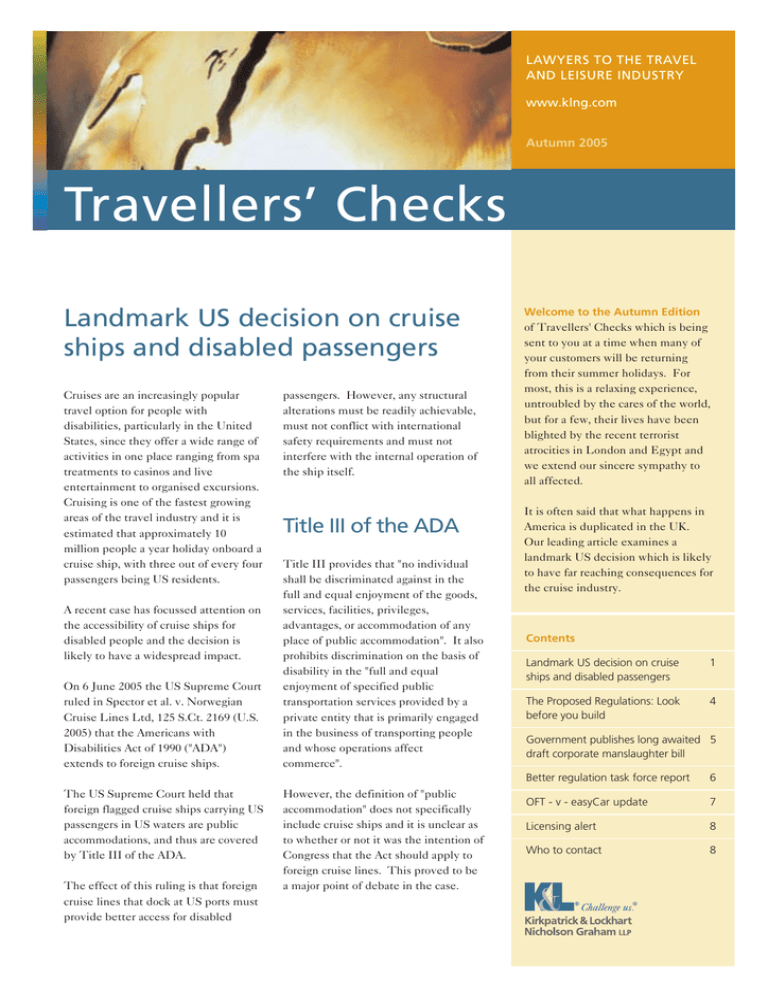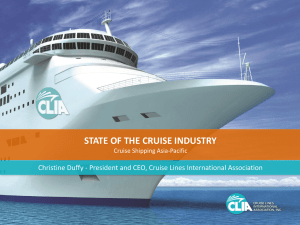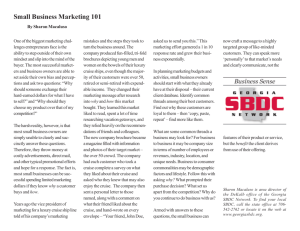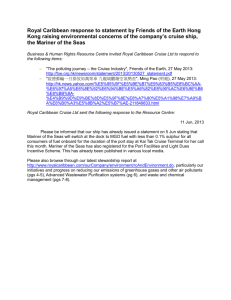
LAWYERS TO THE TRAVEL
AND LEISURE INDUSTRY
www.klng.com
Autumn 2005
Travellers’ Checks
Landmark US decision on cruise
ships and disabled passengers
Cruises are an increasingly popular
travel option for people with
disabilities, particularly in the United
States, since they offer a wide range of
activities in one place ranging from spa
treatments to casinos and live
entertainment to organised excursions.
Cruising is one of the fastest growing
areas of the travel industry and it is
estimated that approximately 10
million people a year holiday onboard a
cruise ship, with three out of every four
passengers being US residents.
A recent case has focussed attention on
the accessibility of cruise ships for
disabled people and the decision is
likely to have a widespread impact.
On 6 June 2005 the US Supreme Court
ruled in Spector et al. v. Norwegian
Cruise Lines Ltd, 125 S.Ct. 2169 (U.S.
2005) that the Americans with
Disabilities Act of 1990 ("ADA")
extends to foreign cruise ships.
The US Supreme Court held that
foreign flagged cruise ships carrying US
passengers in US waters are public
accommodations, and thus are covered
by Title III of the ADA.
The effect of this ruling is that foreign
cruise lines that dock at US ports must
provide better access for disabled
passengers. However, any structural
alterations must be readily achievable,
must not conflict with international
safety requirements and must not
interfere with the internal operation of
the ship itself.
Title III of the ADA
Title III provides that "no individual
shall be discriminated against in the
full and equal enjoyment of the goods,
services, facilities, privileges,
advantages, or accommodation of any
place of public accommodation". It also
prohibits discrimination on the basis of
disability in the "full and equal
enjoyment of specified public
transportation services provided by a
private entity that is primarily engaged
in the business of transporting people
and whose operations affect
commerce".
However, the definition of "public
accommodation" does not specifically
include cruise ships and it is unclear as
to whether or not it was the intention of
Congress that the Act should apply to
foreign cruise lines. This proved to be
a major point of debate in the case.
Welcome to the Autumn Edition
of Travellers' Checks which is being
sent to you at a time when many of
your customers will be returning
from their summer holidays. For
most, this is a relaxing experience,
untroubled by the cares of the world,
but for a few, their lives have been
blighted by the recent terrorist
atrocities in London and Egypt and
we extend our sincere sympathy to
all affected.
It is often said that what happens in
America is duplicated in the UK.
Our leading article examines a
landmark US decision which is likely
to have far reaching consequences for
the cruise industry.
Contents
Landmark US decision on cruise
ships and disabled passengers
1
The Proposed Regulations: Look
before you build
4
Government publishes long awaited 5
draft corporate manslaughter bill
Better regulation task force report
6
OFT - v - easyCar update
7
Licensing alert
8
Who to contact
8
Travellers’ Checks
The facts
The class action against NCL - August 2000
Norwegian Cruise Lines Limited
("NCL") is a Bermuda Corporation with
it’s principal place of business in
Miami, Florida. The company operates
cruise ships that depart from, and
return to, ports in the United States.
Despite the fact that the NCL cruise
ships predominantly serve US residents
and are operated by a company based
in the US almost all their ships are
registered abroad under so-called "flags
of convenience". In this case, the two
ships were registered in the Bahamas
and therefore sail under the Bahamian
flag. Onboard the NCL cruise ships
passengers are provided with food,
entertainment and accommodation (in
either a cabin or a stateroom). The
company also promotes its cruises
through advertising extensively in the
US and most of its revenue is
generated in the US.
Between September 1998 and
September 1999, five US citizens took
cruises on the Bahamian-flagged
Norwegian Sea or Norwegian Star
cruise ships, with the voyages
originating out of Houston. Three of
the passengers were disabled and they
were accompanied on the cruises by
able-bodied passengers. In August
2000 they filed a class action lawsuit
against NCL, seeking declaratory and
injunctive relief under Title III for a
variety of ADA violations. They
claimed that NCL charged premiums
for disabled-accessible cabins and help
from crew members, the shore
excursions were not accessible to those
with mobility impairments, it had failed
to design disabled access to swimming
pools, restaurants, elevators, public
bathrooms and other public facilities
and denied able-bodied passengers
travelling with disabled people access
to these facilities.
In relying on the provisions of Title III
the claimants (known as plaintiffs in
the US) asked the court to:
1) order NCL to end its discriminatory
practices and policies;
2
AUTUMN 2005
2) remove physical barriers on existing
ships (where feasible); and
3) ensure that any newly built ships are
fully ADA compliant.
NCL responded that they were not
bound by the ADA as they were not
subject to US law since they sail under
a foreign flag and that only an explicit
statement by Congress could justify
imposing the US law, even if the ships
docked at a US port.
The Federal District Court in Houston
rejected NCL's argument that they
were not bound by the ADA since they
sail under a foreign flag. The case
proceeded to a Federal Appeals Court
where it was ruled that the ADA did
not apply to foreign-flagged vessels
that come into the US. The matter was
referred to the Supreme Court who
were asked to determine what
Congress intended when it passed the
landmark ADA in 1990 barring
discrimination against the disabled in
the enjoyment of services in places of
"public accommodations".
www.klng.com
The Supreme Court decision
Reversing the decision of the Federal
Appeals Court, the Supreme Court held
that the ADA generally did apply, and
remanded the case for consideration of
the individual violations alleged.
Specifically, the Court found that, while
the ADA would not apply to the
internal affairs of a foreign flagged
cruise ship, it would apply where the
security and well-being of US citizens
or territory was affected. This decision
occupies the narrow jurisprudential
space between Benz et al. v. Compania
Naviera Hidalgo, S.A., 353 U.S. 138
(1957) and International
Longshoremen's Local 1416, AFL-CIO
v. Ariadne Shipping Company, 397 U.S.
195 (1970) without overturning either.
These cases contradict each other in
that one found that the US employment
legislation did apply to foreign flagged
ships docked in US ports, whilst the
other held that it did not.
After careful consideration of both the
above named cases, the Court has
drawn the line for the application of the
ADA to foreign flagged cruise ships at
the point where the policies,
procedures, and facilities have an affect
on US citizens and their rights. Without
deciding, the court indicated a number
of practices that would almost certainly
be prohibited by the ADA. These
include:
I
Charging disabled passengers a
higher fare and special surcharges;
I
Maintaining evacuation equipment
and programs in areas inaccessible to
disabled passengers;
I
Requiring a special waiver of all
medical liability from disabled
passengers;
I
Requiring disabled passengers to
travel with a companion; and
I
Reserving the right to remove from
the ship any disabled individual
whose presence endangers the
"comfort" of other passengers.
The Court suggested that
discriminatory practices like these,
which could easily be changed without
much inconvenience, expense, or
interference with the internal affairs
and management of the vessel, were
violations of the ADA that could and
should be immediately remedied.
Thus, those easily altered policies and
procedures that might be considered
discriminatory should be reconsidered
as soon as possible, as it may only be a
matter of time until lower court cases
confirm that they are ADA violations.
However, the Court also indicated a
number of ADA requirements from
which foreign flagged cruise ships will
most likely be exempt. These include:
AUTUMN 2005
3
Travellers’ Checks
I
Any requirement that would bring
the ship out of compliance with
international safety regulations, such
as the International Convention for
the Safety of Life at Sea (SOLAS), or
any other international legal
obligation;
I
Those that would create serious
difficulties for the vessel and would
have a substantial impact on its
operation;
I
I
Any requirement that would create a
significant risk to the health and
safety of others that could not be
eliminated by a modification of
practices, procedures, or by the
provision of auxiliary aids or services;
Those requirements which would
affect the internal management and
functioning of the cruise line,
particularly those that do not affect
US passengers.
Such requirements, which could
present a safety risk or force the cruise
line to incur substantial cost and
inconvenience, will almost certainly not
apply, not only because of the Court's
indication that they should not, but also
because the ADA's own limitations and
qualifications would prevent the
imposition of such requirements. For
instance, those with disabilities cannot
be "denied services, segregated or
otherwise treated differently than other
individuals because of the absence of
auxiliary aids and services, unless the
entity can demonstrate that taking such
steps would fundamentally alter the
nature of the goods, service, facility,
privilege, advantage, or accommodation
being offered or would result in an
undue burden (emphasis added)".
With regards to the intention of
Congress, Mr Justice Kennedy stated
4
AUTUMN 2005
that "it is reasonable to presume
Congress intends no interference with
matters that are primarily of concern
only to the ship and the foreign state in
which it is registered. It is also
reasonable, however, to presume
Congress does intend its statutes to
apply to entities in United States
territory that serve, employ, or
otherwise affect American citizens, or
that affect the peace and tranquillity of
the United Sates, even if those entities
happen to be foreign-flag ships.
Cruise ships flying foreign flags of
convenience offer public
accommodations and transportation
services to over 7 million United States
residents annually, departing from and
returning to ports located in the United
States. Large numbers of disabled
individuals, many of whom have
mobility impairments that make other
kinds of vacation travel difficult, take
advantage of these cruises or would like
to do so. To hold there is no Title III
protection for disabled persons who
seek to use the amenities of foreign
cruise ships would be a harsh and
unexpected interpretation of a statute
designed to provide broad protection for
the disabled".
"It would be incongruous, nevertheless,
to attribute to Congress an intent to
require modifications that threaten
safety to others simply because the
threat comes not from the disabled
person but from the accommodation
itself. The anomaly is avoided by
concluding that a structural
modification is not readily achievable
…….if it would pose a direct threat to
the health or safety of others" (Kennedy
J).
The Proposed Regulations: Look Before
You Build
The Architectural and Transportation
Barriers Compliance Board is in the
process of revising its guidelines for
large passenger vessels, and has issued
a set of proposed regulations that the
Supreme Court noted in its decision.
These can be found in their totality at
http://www.access-board.com/pvaac/
guidelines.htm.
The regulations, when enacted, will
apply to all passenger vessels covered
by the ADA, so by implication they will
almost certainly apply to foreign
flagged cruise ships now that they fall
under Title III.
These regulations cover every aspect of
ship construction, from boarding and
evacuation to cabins and bathrooms to
recreation areas. Each section of the 113
page document contains special
exceptions to each regulation designed
to maximize ADA compliance while
minimizing inconvenience and the
violation of other safety regulations.
However, under Title III, these
regulations will not apply to existing
ships but will only come into play when
a ship is altered or built. Once these
regulations are enacted, whenever any
section of a ship is altered that space will
have to conform to the regulations to the
maximum extent reasonably feasible.
www.klng.com
Looking Towards the Future
Whilst it remains to be seen what the
long term affects of this new ruling will
be, it is certain that non-complying
policies that can be changed should be
changed, if not immediately then as
soon as lower courts rule on precisely
what is and is not prohibited. Cruise
lines building or altering their ships
should look closely at the proposed
regulations for an indication of what
might be required in the future, and
should be well acquainted with the
regulations once they are enacted.
“To hold there is no Title III
This ruling will undoubtedly have a
substantial impact on the industry, and
companies should be on alert for
forthcoming developments by both the
courts and regulatory agencies.
protection for the disabled."
protection for disabled persons
who seek to use the amenities of
foreign cruise ships would be a
harsh and unexpected
interpretation of a statute
designed to provide broad
Government publishes long awaited draft
corporate manslaughter bill
In the Autumn 2004 and Spring 2005 edition, Travellers' Checks reported on the delayed proposals by the Government to
introduce a Corporate Homicide Bill ("the Bill") following the recommendations of the Law Commission in 1997. In March
this year, Charles Clarke announced the publication of the draft corporate manslaughter Bill that creates a new criminal
offence of corporate manslaughter.
The current law
The proposed Bill
The current law requires establishing
that an individual at the top of a
company is personally responsible and
guilty of manslaughter before the
company can be prosecuted for the
offence. That individual needed to be
the 'controlling mind' of the company.
Traditionally, this has meant that
successful prosecutions have proven to
be extremely difficult and therefore
convictions have been rare.
The first point to note about the Bill is
that it does not apply to individuals but
rather it is about corporate liability and
refers to the companies themselves.
However, individuals would remain
liable to prosecution for offences where
they are personally at fault. The
maximum penalty for corporate
manslaughter will be an unlimited fine
against the corporation rather than
imprisonment. Cases will be heard in
the Crown Court which will also have
the power to issue remedial orders. In
addition, the Bill does not apply to
unincorporated associations or
partnerships.
An organisation will be guilty of an
offence if the way in which the senior
managers run or organise its activities
cause a person's death. There must
also be a gross breach of a duty of care
which the organisation owed them as
their employer or the occupier of a
AUTUMN 2005
5
Travellers’ Checks
building or in supplying goods or
services or performing a commercial
activity. Courts will look at the working
practices set down by the company's
managers and the organisation's
conduct will be assessed against a
number of statutory criteria, including
the extent to which it had breached
relevant health and safety legislation.
Better Regulation Task Force Report 'Better Routes to Redress'
The Bill complements other forms of
accountability, such as prosecutions
under health and safety legislation, and
the expected standards would be
linked to them. In deciding whether or
not an organisation is guilty of
corporate manslaughter, the court will
be able to consider any breaches of
health and safety laws that may have
taken place and any failures to follow
guidance.
Senior managers are those who play a
significant, that is to say decisive or
influential, role in managing or making
management decisions about the
activities of the organisation as a whole
or a substantial part of it. The normal
rules of causation will apply and the
alleged management failure must have
been more than a minor contribution to
the death with no intervening act
breaking the chain of events.
Conclusion
The Bill deals with a highly complex
area of the law and is being carefully
scrutinised by pressure groups, large
corporations and union leaders. In light
of the Bill it is more important than
ever that all companies in the travel
and leisure sector implement a
comprehensive health and safety and
due diligence policy to minimise risks
to staff and customers, particularly
since liability will be linked to these
standards.
6
AUTUMN 2005
Under the current Civil Procedure
Rules a claim for personal injuries in
the small claims court may be brought
if the financial value of the claim is not
more than £5,000 and the financial
value of any claim for damages for
personal injuries is not more than
£1,000. Costs are not awarded in the
small claims court which makes it an
attractive forum for litigants in person.
Claims with a personal injury element
worth more than £1,000 must be
brought in either the fast track or
multitrack. Costs are awarded to the
winning party on the whole.
Last year the Better Regulation Task
Force published the report “Better
Routes to Redress” to advise the
Government of ways in which to tackle
the perceived growth of a
“compensation culture” in the UK. In
particular, the Task Force
recommended that “the Department
for Constitutional Affairs should carry
out research into the potential impact
of raising the limit under which
personal injury claims can be pursued
through the small claims track. The
research should establish a limit which
best balances the benefits to the
claimant and to society against the
costs, but justify any limit lower than
£5,000.”
The Department of Constitutional
Affairs recently announced in their
report “Tackling the Compensation
Culture” that they are researching
further the recommendation by the
Better Regulation Task Force that the
www.klng.com
small claims court personal injury
threshold be raised from £1,000 to
£5,000. The report states that "the
small claims personal injury limit of
£1,000 has not been raised since 1991
and the Government accepts the Task
Force's recommendation to undertake
research into the benefits and costs of
raising it…..However, we recognise
concerns have been expressed for
claimants in personal injury cases if the
limit was raised to £5,000. We also
recognise the concerns expressed that
the processes and costs in these lower
value cases are often the most
disproportionate." If this
recommendation is implemented then
this will impact on personal injuries
claims brought against the travel
industry since many claims that would
have been heard in the fast track will
now be heard in the small claims court.
This will have costs implications since
costs for both sides in small claims are
not recoverable.
“...this will impact on personal
injuries claims brought against the
travel industry since many claims
that would have been heard in
the fast track will now be heard in
the small claims court. This will
Comments
The announcement of further research
into this threshold by the Government
has been criticised as being manifestly
unfair since it would preclude the use
of legal advice by claimants because
costs will not be recoverable. In
contrast insured defendants' are almost
always legally represented. On the
other hand, a personal injury litigant in
person will not have to risk financial
ruin in the process, since they will not
have to pay their opponent's costs if
they lose. It remains to be seen
whether or not this recommendation
will be implemented by the
Government.
have costs implications..."
OFT -v- easyCar
In the last issue of Travellers' Checks
we reported on the Advocate General's
Opinion in the OFT -v- easyCar case,
where the hire of cars was deemed not
to be "transport" and that accordingly
consumers were entitled to a cooling
off period if they had bought such
services on the internet or by phone
(distance selling). In an unusual
development, the European Court has
reversed the AG's Opinion and has
found in favour of easyCar. It follows
that the hire of cars is a transport
service and is exempted from the
cooling off period allowed generally to
consumers under Directive 97/7/EC
and the UK Distance Selling
Regulations.
AUTUMN 2005
7
Travellers’
Checks
Travellers’ Checks
Licensing Alert
Bars, clubs, pubs and off-licences can
now apply for alcohol and public
entertainment licenses under the new
licensing regime. The Licensing Act
2003 represents a complete overhaul of
the old licensing arrangements and
means that Licensing Authorities,
rather than Magistrates Courts, have
now begun processing licensing
applications for conversion to new style
licences.
The rationale behind the new regime is
to encourage greater flexibility in
relation to opening hours and an overall
aim to create a continental, café style
drinking environment. However,
Licensing Authorities must take into
account any impact this may have on
local residents and businesses when
reaching their decisions.
If you have missed this deadline you
will have to make a new style
application for a premises licence,
personal licence or club premises
certificate in accordance with the new
Act. There is a great deal of guidance
about the licensing applications but
your first port of call should be the
Local Authority with jurisdiction for
your licence. We have been involved
with many licensing matters, from the
purchase of pubs and hotels, to the
building of premises and securing the
necessary licences.
For further information on this matter
please contact:
Polly Woodfield
pwoodfield@klng.com
Tel: +44 (0)20 7360 8180
To ensure a smooth transition to the
new regime, you should have applied
to convert your current justices' licence
by 6 August 2005.
Who to Contact
Kirkpatrick & Lockhart
For further information contact
Nicholson Graham LLP
Cynthia Barbor
cbarbor@klng.com
T: +44 (0)20 7360 8170
110 Cannon Street
Laura Harcombe
lharcombe@klng.com
T: +44 (0)20 7360 8186
London EC4N 6AR
www.klng.com
Kirkpatrick & Lockhart Nicholson Graham (K&LNG) has approximately 1,000 lawyers and represents entrepreneurs, growth and middle market companies, capital
markets participants, and leading FORTUNE 100 and FTSE 100 global corporations nationally and internationally.
K&LNG is a combination of two limited liability partnerships, each named Kirkpatrick & Lockhart Nicholson Graham LLP, one qualified in Delaware, U.S.A. and practicing from offices in Boston, Dallas, Harrisburg, Los Angeles, Miami, Newark, New York, Palo Alto, Pittsburgh, San Francisco and Washington and one incorporated in
England practicing from the London office.
This publication/newsletter is for informational purposes and does not contain or convey legal advice. The information herein should
not be used or relied upon in regard to any particular facts or circumstances without first consulting a lawyer.
Data Protection Act 1998 - We may contact you from time to time with information on Kirkpatrick & Lockhart Nicholson Graham LLP
seminars and with our regular newsletters, which may be of interest to you. We will not provide your details to any third parties.
Please e-mail cgregory@klng.com if you would prefer not to receive this information.
8
AUTUMN 2005
© 2005 KIRKPATRICK & LOCKHART NICHOLSON GRAHAM LLP. ALL RIGHTS RESERVED.





